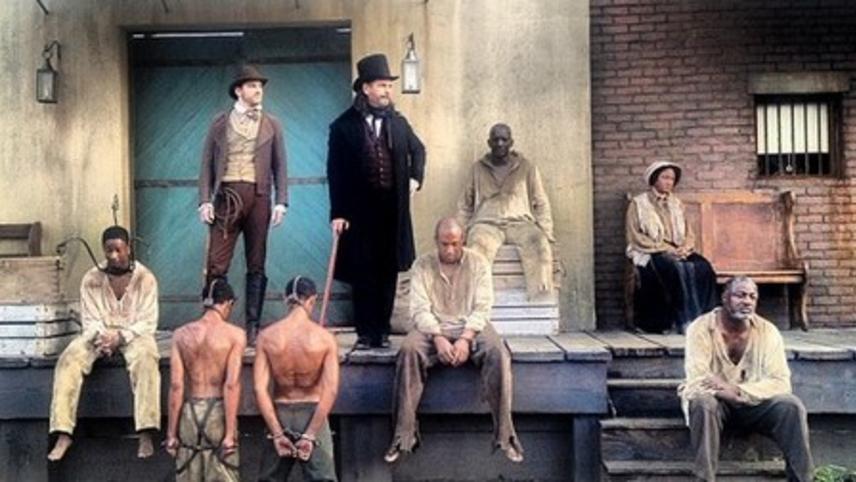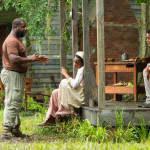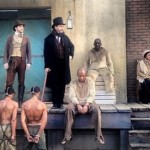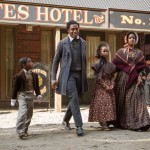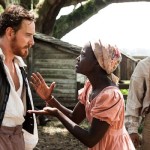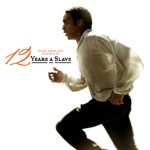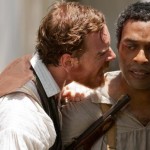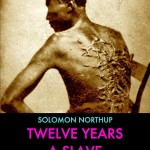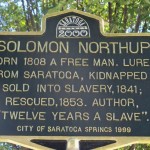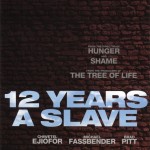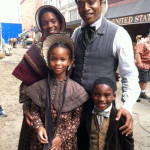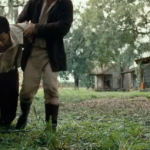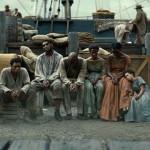Slavery (ˈsleɪvərɪ) n
1. (Law) the state or condition of being a slave; a civil relationship whereby one person has absolute power over another and controls his life, liberty, and fortune2. the subjection of a person to another person, esp in being forced into work3. the condition of being subject to some influence or habit4. (Industrial Relations & HR Terms) work done in harsh conditions for low pay
When I first saw the preview of 12 Years a Slave, my initial reaction was scepticism, not least because there is a long history of didactic sob story movies about slavery and suffering, of which Spielberg is one major exponent (The Color Purple, Amistad etc.) Lincoln was of course about the abolition of slavery but notably failed to spend any time depicting the conditions in which slaves lived and died, and the motivation for removing this abomination from American society – nor indeed the fact that there are almost certainly Americans who would reintroduce slavery like a shot, had they the choice.
Meanwhile, Tarantino claimed in an interview with the excellent Krishnan Guru-Murthy to have exposed slavery to the world in Django Unchained. Wikipedia tells the story:
In January 2013, Guru-Murthy interviewed Quentin Tarantino who was promoting his new film, Django Unchained (2012). When he asked Tarantino to consider whether there is a link between film violence and real-life atrocities in America, especially in the wake of the Sandy Hook Elementary School shooting. Tarantino responded, “I refuse your question. I’m not your slave and you’re not my master. You can’t make me dance to your tune. I’m not a monkey.” and later on also “It’s none of your damn business what I think about that!… And I’m shutting you down.”
Tarantino’s antics notwithstanding, Django Unchained is ultimately cartoonish violence and not a movie about slavery at all. However, there are plenty more tugging on the heartstrings. What more could this one add?
For one thing it chooses as its source the equivalent of Anne Frank’s Diary in the context of slavery, a first-hand account of what life was really life through the 1853 autobiography of Solomon Northup, who began life as a “free negro” in New York, a talented musician who was tricked in a job interview, drugged, kidnapped and sold as a slave in the plantations of Louisiana for 12 years. It recounts that story almost verbatim, if anything toning down some of the horrors for the palate of modern audiences. It is neither corrupted nor sensationalised, but in this case the truth is more horrific than any fiction.
In fact, the movie, like the book, is an exploration of many facets of slavery, some of which will make the audience feel very uncomfortable for the parallels with how they use others in service. It makes an interesting contrast to the other biopic I’ve seen this week, Mandela: Long Walk To Freedom, where the subject is also a victim of enforced servitude, though grows to become world-famous.
The point here is that most slaves died terrible deaths in anonymity, without the benefit of eduction to articulate the plight of those who suffered at the hands of plantation owners. We know slavery was and is one of the most terrible evils mankind has ever devised, being the deliberate and systematic dehumanisation of fellow members of the same species. What we need are the facts rather than myths, and the facts are what we are given.
Secondly, the director, Steve McQueen (no relation), is black and from a very different background to most movie directors. He is certainly the only director to have won the Turner Prize, his 2006 entry Queen and Country commemorating British soldiers killed in Iraq. His perspective may well have influenced the movie in directions it might not otherwise have gone, though the reviews I’ve heard (notably that of Mark Kermode) suggest that where McQueen succeeds is by his supreme ability to tell a rattling good story, regardless of the subject matter, though he is far from afraid to tackle difficult subjects head-on (see Hunger and Shame.) The fact that he is a British man of black West Indian descent is utterly irrelevant.
His style of direction is worthy of note, certainly appropriate to the intention to make this a close, intimate, at times almost claustrophobic character study of the contrast between the slaves and the slave owners. The camera lingers long on the minutiae of their activities in extreme close-up, but most of all their faces – capturing every thought and feeling with painstaking care. He observes the fear and pain etched, engrained on their pitiful faces – people from all hope and longing have been drained, a form of brainwashing where the mind remains free. But best of all is that McQueen avoids the temptation to manipulate us to emote at the plight of his characters, right up to the end for Northup’s heart-wrenching reunion with his family. Only at that point in this desperately sad story did I feel the tears falling, and, strangely enough, only at that point does Northup cry hot salty tears.
Also worthy of note is how he introduces two recurring themes, that of music, appropriate given that Northup is a fine fiddler, and of the enduring beauty of the landscape of the Deep South. Music is in the tradition, the lament of the plantation slaves that became the blues and gospel, rich in biblical references and deeply haunting. The film references nature throughout, an ironic juxtaposition to the short and violent lives of most of the subjugated people of the land.
But perhaps the most important quality McQueen brings to 12YAS is the ability to entice from actors truly remarkable performances. You’d expect he would do so from experienced actors like Brad Pitt, McQueen’s long-time collaborator Michael Fassbender (whose Irish-German ancestry brings to mind that wonderful quote from the Godfather: “Now listen, my Kraut-Mick friend…“), the supremely fashionable Benedict Cumberbatch, Paul Giametti (a favourite actor of mine), Alfre Woodard (who has been a sensationally good character actress in many movies without ever being a household name) and indeed the astonishing Chiwetel Ejiofor (of whom more in a moment.) Quite an international cast.
But consider for a moment that Kenyan actress Lupita Nyong’o had never previously appeared in a movie before being cast as Patsey. Never once does she looked awed by appearing in such fine company, but more to the point displays credibility and maturity many others would do well to note. Acting a woman going through the torture of being whipped til her flesh literally flies in clumps from her body is no mean feat, yet I believed it totally.
Make no mistake, this is a brutal movie, one which records terrible scenes that no man should ever have to witness: hangings (of others and nearly of Northup himself), appalling beatings, yet the slaves have to pretend they saw and heard nothing. There is one scene where Northup is all but hanging, the tips of his toes still on the ground, yet all but one of the other slaves go about their business and leave him there – to get involved would be certain death. The advice given to Northup before he arrives by steamer down the Mississippi is that to survive you say and do as little as possible, take orders and never argue back.
Where 12YAS succeeds in a genre where many have failed is by pulling no punches – it is always powerful, and indeed at times almost unwatchable, without ever being preachy or moralistic; the facts speak for themselves.
The psychotic slave-owner Epps (Fassbender) is depicted for what he is and was, no commentary being necessary, where by comparison William Ford (Cumberbatch) appears benign, even benevolent, but is still a slave-owner with no inclination to set free those whom he treats as property. Credit to Fassbender, whose cruelty is tempered with an almost humorous but threatening presence that those close to him know could easily turn against them. To that extent he reminds me of Kevin Kline‘s character, Otto, in A Fish Called Wanda – which is a compliment! But so intense is the performance I could barely watch Epps on screen, since you knew something would happen. In this case it is Patsey who suffered, the slave who he had been using for sex, much hated by Epps’s fiancée, though in truth any of his slaves could have died at his hands. If slavery was the evil of the time, Fassbender is the face of that evil.
But what of Ejiofor? He’s always been known as a fine and versatile actor. I respected his performance as a detective in The Shadow Line, though he has appeared in many guises and even won an Olivier award as Othello in 2008. Here he has fully come of age. This is more than just a grown-up performance, it is immense. He fills the screen with his nobility, the suppressed self-righteous spirit of a free man that burns on in his breast – though it nearly causes his death when he is betrayed. I hope truly that this is an undemonstrative model for actors to follow, displaying the art in its truest form without having to speak in long monologues or even at all for much of the time. But his face speaks volumes, for which huge credit must be given to actor and director alike.
This is not a movie with a vast or complex plot, but then it does not need to be. It is what it is, and what it is is a simple tale told beautifully, not pretending to be anything other than what it is. For that lack of pompous agenda alone it deserves gongs, but I fully expect McQueen, Ejiofor, Fassbender and Nyong’o to be up for awards aplenty, plus the technical awards which contribute so much to the overall success of the film. It’s not the greatest film ever but of its genre it is a masterpiece and deserves to be seen by many.
Oh, and the audience reaction? Stunned silence. It was as if nobody moved for several minutes as the film closed and the credits rolled. How often can you say that?

